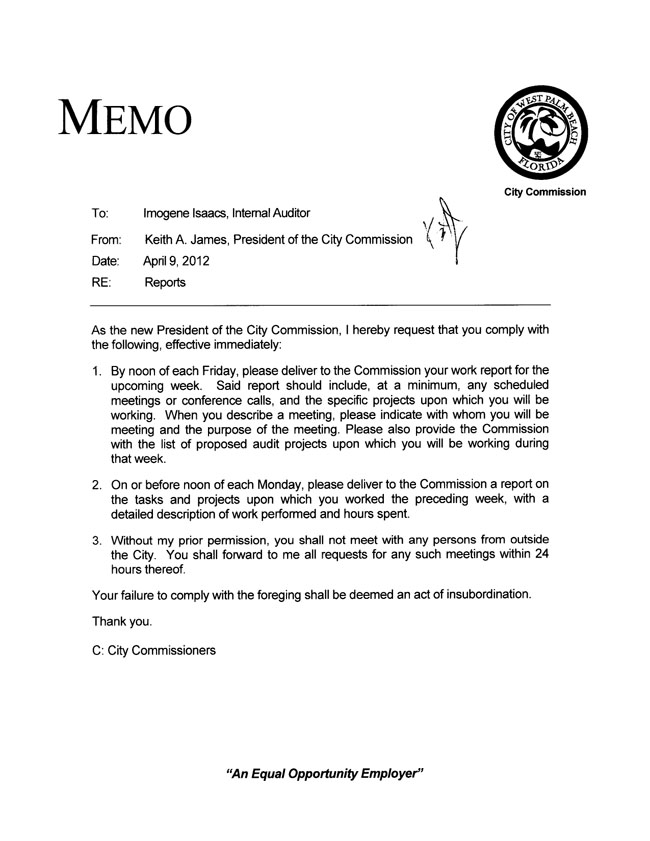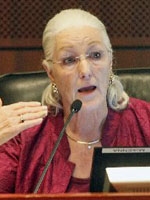Why WPB Needs Your Taxes!
The taxpayers of WPB pay $12,000.00 a month for Federal lobbyist Holland and Knight to represent the city. Commissioners James and Robinson constantly travel to League of Cities running behind Holland and Knight, spending tax dollars and cannot tell the residents paying the tab what they have accomplished. Commissioner Robinson once reported on a trip from Washington, DC. Mayor Muoio wrote letters to Representatives Frankel, Murphy and Hastings, and none of the 3 received the letters. Frankel & Murphy have offices on Military Trail, and Hastings has his office in Ft. Lauderdale. It cost the taxpayers $5,221.57 to learn that letters were not delivered in Washington. Waste!
Commissioner James traveled to Hollywood Florida (100 miles round trip) and spent 2 nights in a hotel and it cost the taxpayers $845.56 When the PB Post questioned him on the motel stay he claimed early morning meetings. After receiving a Public Records Request I learned every meeting was held in the afternoon except for the Continental breakfast which was 7-9 AM. Commissioner James lied, and took advantage of the taxpayers. At a city work session 7/1/13 Commissioner James mentioned the travel budget was depleted and he and Commissioner Robinson traveled at their own expense on a second trip to Washington DC. In reality the taxpayers paid a total of $675.00 air fair. Another lie by Commissioner James.
Commissioner Robinson has received over the years a car allowance totaling $67,900.00 so why when he travels on his day trips to Orlando does he present a travel expense report for tolls and gas and receive reimbursement of approximately $100.00. for each trip? Why does Dorrett Miller sign off on all these expenditures? What’s the purpose of the car allowance?
When the commission placed $10,000.00 in the travel budget, it was with the understanding they would seek permission from the commissioners to access the money. Together they have made numerous trips, spent thousands of taxpayer dollars and it is all done at a commission work sessions held at 10:00 AM away from public view, where input from residents is not allowed. The commissioners supposedly are to vote on matters at a regular mayor/city commission meeting held at 5:00 PM where residents have a right to address their commissioners. If they feel they are acting properly, why the need to be so devious about it?
Commissioner Ike Robinson is 76 years old and has been eligible for Medicare for 11 years, but chooses instead the “Cadillac” Executive Employees plan, paid entirely by the taxpayers of WPB. The “Cadillac” plan cost the Commissioners not one dime in contributions or deductibles. The insurance monthly premium schedule for 2012 has the residents paying $1,349.30/mth, or $16,191.60/ yr. for commissioner Robinson and his wife. I estimate the total for this one commissioner to be in the ballpark of between $150,000.00 to $180,000.00 dollars over the years. That combined with his car allowances adds up to approximately $200,000.00 over 11 years. Not bad for two perks, and a retired guy. Commissioner Robinson has stated he will not run again in 2015. I say about time.
Redemptive Life Fiasco Led to Retaliation Against WPB Auditor
On Oct.18, 2013 a story in the PB Post reads “HUD asks West Palm Beach to pay back $3 Million.”
Seems the city did an extremely poor job in their managing of low-income housing grants received from HUD to build homes in the poorest section of West Palm Beach.
The city turned over millions to Redemptive Life Church run by Bishop Harold Ray to build these homes,between 2005 and 2012, with little or no oversight, and now the city is looking to Redemptive Life for reimbursement. Good luck with that! In my opinion if the city had vetted Bishop Ray correctly the problem could have been avoided. Bishop Ray is living in a $600,000.00 home, and in my opinion should send the city of WPB a “thank you” card and a fruit basket. Once again it will fall to the taxpayers.
The PB Post broke the story early in 2012 and immediately after WPB Independent Auditor, Imogene Isaacs was blamed for leaking the story to the post. The City Independent Auditor did not perform the review of Redemptive Life, but was done by the housing staff who found the very serious problems. In the same time frame Ms. Isaacs and her staff along with human resources performed the review of the time and attendance of the 3 housing employees accused of wage theft. The powers to be decided Ms. Isaacs had to go after 22 years of service to this city. Commissioner Keith James, within a week of being appointed as president of the commission, fired off a memo to Ms. Isaacs which caused Ms. Isaac’s resignation.Read the memo and judge for yourself.

In 2005,08,&10 the city placed liens against Redemptive Life and Keith James, now Commissioner James, represented the church against the city of WPB, and he responded to me in an e-mail when I questioned the story. This was Commissioner James response to me.
Regards
Keith A. James
Commissioner, District 4
Well Commissioner James the investigation is over, and you still forced out one of the most committed city employee named Imogene Isaacs.
HUD Inspector General’s Office in Washington D.C. has released the report on the city of WPB. Read and judge the report for yourself.
Reports & Publications Results
September 30, 2013 | Audit Reports
Report Number: 2013-AT-1008:
City of West Palm Beach Did Not Always Properly Administer Its HOME Program
January 9, 2008 | Audit Reports
Report Number: 2008-AT-1004:
The City of West Palm Beach, FL, Did Not Properly Administer Its Community Development Block Grant Program
Can’t Fix West Palm Beach
Cosmetic changes
Regarding the comments by former City Administrator Ed Mitchell that the “stature” of the city has improved: Clematis Street is a well-dressed watering hole, with boozers stumbling from one bar to another. If it wasn’t for the nonstop “free” events downtown, the waterfront would go back to tumbleweed.
CityPlace recently had foreclosure issues. The city had to dip into reserves to balance the budget. The new budget year started this month, and the city’s finance director has publicly stated that the city is starting out in the red. If more changes are not made, the deficit for this budget year will be greater than the $8.5 million first projected for last year. Let’s not forget the many failures of city departments that were under the direct supervision of Mr. Mitchell, such as the OpenSky police radio system that’s yet to be activated.
So the city’s degree of development and outward appearance has improved? To me, it’s like putting a fresh coat of paint on a house infested with termites and boasting about its outward appearance.
West Palm Beach CRA Selection Committee’s First Meet Postponed
According to the city, representatives of two of the six organizations serving on the committee, have scheduling conflicts and hopes to reschedule some time in the next few weeks. This is one process to watch because when the city announced they would outsource their CRA Department, Kim Briesemeister, who was currently acting as their CRA Director, resigned August 26th so that her Broward County based firm, RMA Associates could participate in the bidding process. Word leaked to the press that Ms. Briesemeister expressed confidence that the commissioners would choose her company, to a couple of CRA employees but denied the accusations when confronted by the press.
There is a public concern about two members on the selection committee having conflicts of interest. It is said that Russel Greene, who is president of the CRA Advisory Board, has a relationship with Briesemeister and stated that he is in favor of her RMA Company winning the bid, at a chamber meeting, where he is a board member and CRA Finance Director, Jeff Greene, who Kim worked with and helped him draft the RFQ, has a vote.
Kim Briesemeister was also the captain of the Digital Domain Ship that ran a muck costing WPB tax payers several million dollars so It’s past time for Ms. Briesemeister to move on and throw her hat in another unsuspecting ring.
WPB Officials Disrespects OIG
A report recently released by the OIG concerning an interview with City Commissioners Robinson, James, Materio and Moffett, and included City Attorney Claudia McKenna. A PRR was requested from the OIG office for a copy of those interviews. An editorial in the PB Post, Randy Schultz wrote the post views on the story.The OIG interviewed the 5 named city officials in connection with the repayment of $7,325.00 taxpayer dollars to Commissioner Mitchell for Attorney fees, which was investigated by the OIG office, and found to be improper.
The interview’s for the city commissioners was conducted by Investigator Gary Byers.
The interview for City Attorney McKenna was conducted by Investigator Gary Byers & General Council Rob Beitler. All 5 interviews were held at the office of the OIG, and all officials were sworn in by Mr. Byers.
Note: The audio of those interviews is available to stream or download via the links under the pictures below.
My thoughts on the interview are as follows.
Commissioner Materio was respectful and responded to question’s asked by the OIG, and relied on city attorney for explanation’s as to reimburse Commissioner Mitchell. Commissioner Materio stated she believed Commissioner Mitchell was acting as a private citizen, and not in her official capacity as city commissioner. In her final statement Commissioner Materio stated this was “silly and a waste of time and money” I respect her opinion but the taxpayer’s who paid the $7,325.00 find nothing “silly” about it. Interview time: 14:40
Commissioner Moffett was also respectful and responded to question’s asked by the OIG, and also relied on the city attorney for guidance in the reimbursement of funds. When asked if Commissioner Mitchell was acting in her official capacity she replied “no”, and further stated “We shouldn’t have done it.” She then suggested the OIG “talk to the legal dept. we may have been led astray” Interview time: 16:33
Commissioner Robinson appeared aggravated and defensive, and at one point raised his voice. He stated “I followed the recommendation of my city attorney” on 2 occasions, and mentioned “attorney” no less than 15 times. My question to Com. Robinson would be if he depends on the city attorney for answer’s why did the entire commission vote to retain their own attorney, and on the subject of Commissioner Mitchell, why was the question to reimburse not directed to their attorney? Interview time: 12:25
Commissioner James appeared defensive, combative, and arrogant. He answered “no” or “I don’t recall” no less than 7 times to questions asked of him. He questioned the authority of the OIG 3 times, and said he was not there to defend the action he took in his vote to reimburse the $7,325.00 to Ms.Mitchell. It appears to me he feels he needs answer to no one for his actions, including the taxpayers who will pay this bill, or to the voters who mistakenly put him in office. Commissioner James interview time was the shortest at 4:38.
City Attorney Claudia McKenna appeared disingenuously repetitive, and vague. Ms.McKenna answered no questions, and repeatedly questioned the OIG jurisdiction over her and others, and used the word “Jurisdiction” no less that 40 times. When asked a question her response was with the words Fraud, Waste, Mismanagement, Misconduct, and Abuse 22 times. My question to Ms. McKenna would be if you believe, as stated, the OIG “has no jurisdiction over me” why did you feel compelled to accept their invitation to meet for an interview, why not decline? Her Interview time was 42:35.
The Inspector General Lawsuit – Myths and Reality
It’s been over two years since a group of Palm Beach County municipalities sued the county to avoid paying their share of the Inspector General’s budget. While the litigation drags on (a court date has been set for next January), the Office of Inspector General has been starved of funds and unable to continue staffing beyond 60% of her projected levels.
The public statements made on behalf of the litigants is that it is “all about the money”, and they believe the county has no right to require them to pay for the OIG services, in spite of the clear intention of the referendum passed by 72% of the voters.
This is not to say that the litigants do not chafe at the very idea of external oversight. Challenges to the authority of the OIG have taken other, less public avenues, like limiting the OIG jurisdiction with “definitions” of waste, fraud and abuse, instituting rules for public employee dialog with the OIG, and impeding access to meetings and documents.
Although West Palm Beach is considered the “ringleader” of the lawsuit, and many of the cities say they are following their lead, central to the action is the law firm of Corbett, White and Davis, P.A., and WPB City Attorney Claudia McKenna. Corbett, White and Davis represent the League of Cities, and twelve of the county municipalities, five of which are participants in the lawsuit. Principals Trela White and Jennifer Ashton shared the League Counsel seat on the OIG and Ethics Ordinances drafting committee and mounted a serious but unsuccessful effort to include the “waste, fraud and abuse” definitions in the ordinances. White/Ashton were voting members when the committee approved the funding methodology that is now being challenged in the lawsuit. McKenna was present for many of the committee meetings, and although she did object to the funding approach in a statement, it was no surprise to her how the funding was to work or why the method was selected.
Although it has been assumed that the West Palm Beach City Commission voted to participate in the lawsuit, a vote may not have been taken. In October of 2011, CWD principal Keith Davis wrote a memo to the “Mayor and Council Members”, outlining the purpose of the lawsuit, and making the case that the IG funding mechanism is an illegal tax under Florida law, and inconsistent with the charter amendment. The memo, which was obtained by West Palm Beach activists through an open records request, further stated that it constituted double taxation (ie. residents are paying twice for service) and that the municipalities have lost control of their budget.
This letter was referenced by City Attorney Claudia McKenna in a memo on October 27, where she listed eleven cities that had joined or were expected to join the lawsuit and recommended that WPB should join as well. It starts with
“As we have discussed with each of you individually, for the past several months the City Attorney’s office has been in discussions with City Attorneys representing numerous municipalities within the County.”
and concludes with: ”
Unless the office receives an objection regarding challenging the funding, the City Attorney’s office will join the City of West Palm Beach as a plaintiff in the lawsuit.”
Myths and Reality
In the Davis memo a rationale is presented which is a mixture of truth, misdirection and mischaracterization of the content and intent of the IG ordinance (the “myths”). Although it will be a court that decides what is truth and what is not, here are the statements and some things to consider. We report and you decide.
Myth 1: The current IG funding mechanism is an illegal tax on a municipality. Since it is not a user fee (no direct tie from fee to service provided) or a special assessment (no benefit to real property), it must be a tax – which the county cannot levy on a municipality. The fact that the voters approved it does not make it legal.
Consider: The voters of each municipality passed the charter amendment that extended the IG over their cities, including the responsibility to pay for it. Oversight consists of infrastructure (such as a call-in line to report wrongdoing), and periodic review of city contract activity and decision-making. The level of effort in a given year depends on the amount of activity that requires scrutiny, and is not fixed. It is “there for you” much as a hotel swimming pool is part of the room fee, even if you don’t swim in it. The fee is objective (based on LOGER activity). A case can be made that it is a fee and is not illegal.
Myth 2: The current IG funding mechanism is inconsistent with the charter amendment (which calls for an amount 0.25% of contract activity) because it uses the LOGER system which looks at other things besides contract activity.
Consider: The ordinance drafting committee devised a formula to extract relevant contract activity from the LOGER system and IG funding is not related to “other” LOGER activity. Furthermore, it is backward looking to smooth out spikes in activity, and excludes “extraordinary” contracts such as the operation of the Lake Worth power plant.
Myth 3: Assessing a contract fee as suggested in the ordinance would be an illegal tax as well because funded activities do not directly relate to the vendor paying the fee.
Consider: This is not the current method, but if it was, see myth 1 above.
Myth 4: It is double taxation – municipal residents are already paying for the county’s share of the IG funding alongside those in unincorporated areas, in addition to municipal taxes to support the city share of the budget. A taxpayer receives the same share of IG services wherever they live so city residents pay twice.
Consider: IG activity is related to the business of government. The county government and its 10,000 employees and $4B budget requires oversight, and all county taxpayers fund this through county millage. Each municipality has its own separate government, also requiring oversight (the unincorporated areas do not). The city share of IG funding covers city government, not county, and it is a separate activity and a separate expense.
Myth 5: The Municipalities have lost control over their budgets because the county can raise the fee without input from the cities, compromising their home rule “exclusive right to appropriate funds as they deem necessary in the responsible operation of government.”
Consider: Next year budget allocation to the cities are taken from current year LOGER. The municipalities can look at this as easily as the county, so they are not blind-sided. Furthermore, a provision of the IG ordinance requires IG budget review by a representative panel from the League of Cities. This occurs yearly in front of the county commission, and to date, no budget objections have been registered.
Likely Outcomes
The current leaders of West Palm Beach and the 13 other suing municipalities are dug in on their position and not likely to end this lawsuit voluntarily. Perhaps it will be decided by the court in January. If not, remember that the municipal elections are coming in March. We will make every attempt to identify the challengers who would end this lawsuit and require the municipalities to pay their share of the IG funding. We believe then ethics-minded citizens will rally around these candidates, much as 72% of the voters supported the extending the IG jurisdiction over the cities. It already worked in Wellington and that city withdrew from the lawsuit when the challengers won election. We will never erase the stain of “corruption county’ until obstruction by public officials is stopped.





